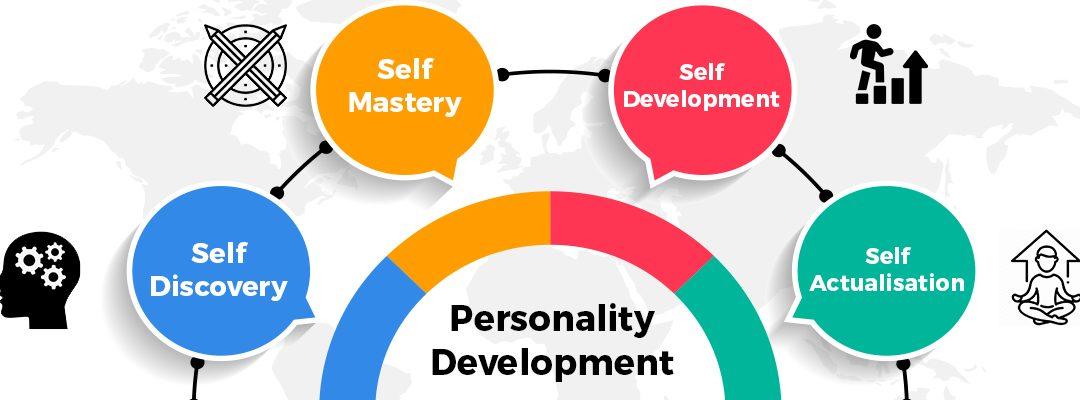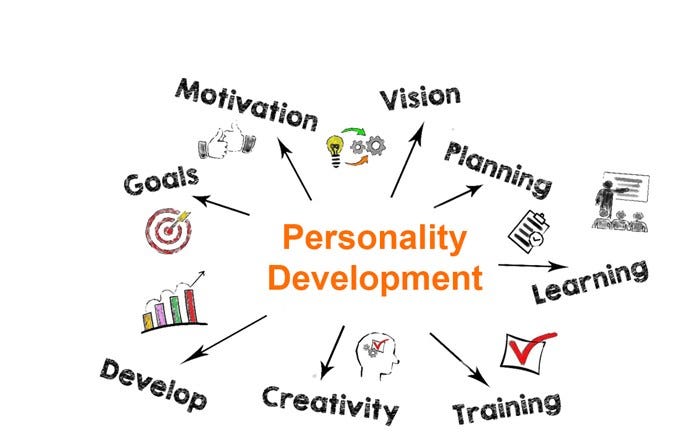Personality Development?
Personality development refers to the process of enhancing and refining various aspects of an individual’s character, behavior, attitudes, and mindset to become a better version of oneself. It encompasses both intrinsic and extrinsic factors that contribute to shaping an individual’s personality throughout their life. 
Personality Development depends on:
- Self-awareness: Understanding one’s own strengths, weaknesses, values, beliefs, and emotions is fundamental to personality development. Self-awareness allows individuals to recognize areas for improvement and work towards personal growth.
- Self-confidence: Building self-confidence involves believing in one’s abilities, qualities, and judgment. Confidence enables individuals to face challenges, take risks, and pursue their goals with determination.
- Effective communication: Developing effective communication skills is essential for expressing thoughts, ideas, and emotions clearly and assertively. Good communication fosters healthy relationships, enhances social interactions, and promotes career success.
- Emotional intelligence: Emotional intelligence involves recognizing, understanding, and managing one’s own emotions as well as empathizing with the emotions of others. It enables individuals to navigate interpersonal relationships, handle conflicts, and make sound decisions.
- Adaptability: Being adaptable and flexible in various situations allows individuals to cope with change, overcome obstacles, and thrive in diverse environments. Adaptability fosters resilience and helps individuals learn and grow from experiences.
- Continuous learning: Engaging in lifelong learning and personal development activities promotes intellectual growth, expands knowledge and skills, and fosters innovation and creativity. Continuous learning enables individuals to adapt to new challenges and stay relevant in a rapidly changing world.
- Goal setting: Setting and striving towards meaningful goals provides direction, motivation, and a sense of purpose in life. Goals help individuals focus their efforts, prioritize tasks, and achieve desired outcomes.
Personality development is a lifelong journey that requires self-reflection, self-discipline, and a willingness to learn and grow. It involves consciously cultivating positive habits, attitudes, and behaviors that align with one’s values and aspirations.
Components of Personality:
Personality development involves multiple components that interact and influence each other. Here are some key components:
- Temperament: Temperament refers to the innate tendencies and predispositions that individuals are born with. It includes aspects such as emotional reactivity, activity level, and sociability.
- Genetics: Genetics play a significant role in shaping personality traits. Certain traits may be inherited from parents or other family members, influencing characteristics like extroversion, introversion, and neuroticism.
- Environment: Environmental factors, including family upbringing, cultural background, peer influences, education, and socioeconomic status, contribute to personality development.
- Socialization: Socialization refers to the process by which individuals learn and internalize societal norms, values, and behaviors through interactions with family, peers, and society at large.
- Experiences: Personal experiences, both positive and negative, shape personality development. Life events, such as successes, failures, relationships, and challenges, can influence beliefs, attitudes, and behaviors, leading to personal growth and self-discovery.
- Cognitive processes: Cognitive processes, including perception, reasoning, problem-solving, and decision-making, contribute to personality development. How individuals interpret and make sense of their experiences and the world around them can shape their beliefs, values, and attitudes.
- Emotional intelligence: Emotional intelligence involves the ability to recognize, understand, and manage one’s own emotions, as well as empathize with others.
- Personal values and beliefs: Personal values, beliefs, and principles guide behavior and decision-making, influencing aspects of personality such as integrity, authenticity, and moral reasoning. Clarifying and aligning with one’s values can contribute to a more coherent and authentic sense of self.
If you want to know more new topic contact here!
Summary

Article Name
What is Personality Development
Description
Personality development refers to the process of enhancing and refining various aspects of an individual’s character, behavior, attitudes, and mindset to become a better version of oneself. It encompasses both intrinsic and extrinsic factors that contribute to shaping an individual’s personality throughout their life.
Author
Sahil Bhatt
Publisher Name
Sahilcreationhub


Hey Students!
Summer semester’s almost here! Get a head start and grab all your eTextbooks (over 15,000 titles in convenient PDF format!) at Cheapest Book Store. Save BIG on your studies with 20% off using code SUMMERVIBE24.
Still missing a book? No problem! Submit a request through our system and we’ll add it to our collection within 30 minutes. That’s right, you won’t be left scrambling for materials! ⏱️
Don’t wait – visit https://m.cheapestbookstore.com today and ace your summer semester!
Happy Learning!
Cheapest Book Store
Купите тротуарную плитку по лучшим ценам – выбор для вашего дома
тротуарная плитка http://www.trotuarnaya-plitka3.ru/ .
Navigating the World of Dermal Fillers: Tips for First-Timers
innotox https://www.fillers-biorevitalizants1.com/ .
Оформляй заказ алкоголя с доставкой – это удобно и просто
заказ алкоголя http://www.dostavka-alkogolya-moskva-nochyu-1.ru/ .
Расценки на клининг: стоимость услуг по уборке
клининг стоимость за 1 кв м https://genuborkachistota.ru .
Клининг Москва: Услуги по уборке квартиры и дома качественно
Клининговая компания Клининговая компания .
Заказать генеральную уборку квартиры в Москве: цена и услуги
ген уборка http://genuborka11.ru/ .
Почему Куго М5 Про – идеальный выбор для городского передвижения
купить самокат куго м5 про https://kugo-m5-pro.ru/ .
Услуги клининга: уборка квартиры после ремонта в Москве
клининг квартиры москва после ремонта https://www.genuborka2.ru .
Найдите рабочее зеркало Вавада для игры без преград
вавада зеркало рабочее https://www.vavada-zerkalo-segodnya.top/ .
Бытовки под ключ: Быстрое строительство и гарантия качества
бытовка купить http://www.bytovki-kupit1.ru .
Срочная наркологическая помощь в Самаре: куда обратиться
клиника наркологии самара https://www.narcologicheskaya-clinika-samara.ru .
Тренажеры для фитнес-клубов на заказ: Индивидуальный подход к каждому клиенту
тренажер для спортзала https://trenazhery-dlja-fitnes-klubov.ru .
Лучшие компании по аренде яхт в Сочи: рейтинг и отзывы
аренда яхт сочи https://arenda-yaht-v-sochi02.ru/ .
Круглосуточный вывод из запоя в наркологической клинике
вывести из запоя https://wyvod-iz-zapoya01.ru/ .
Kugoo Kirin M4 Pro: Идеальный выбор для повседневных поездок
самокат kugoo m4 pro цена https://kugo-m4-pro.ru/ .
Казино Вавада: Лучшие слоты, настольные игры и эксклюзивные предложения онлайн
Вавада рабочее зеркало сайта http://casinovavada-official.ru/ .
Пансионаты для пожилых людей: как обеспечить достойное проживание
частный пансионат для пожилых https://pansionaty-dlya-pozhilyh77.ru .
Сборные бытовки: быстрый монтаж и легкость конструкции
бытовки цены https://bytovki-moskva1.ru/ .
Как заказать алкоголь онлайн: Быстрая и удобная доставка
доставка алкоголя в москве dostavka-alkogolya-moskva-nochyu-4.ru .
Светодиодные лампы с разными цоколями: выбор для индивидуальных нужд
лампа накаливания купить http://www.lamp123.ru .
Школа вокала: путь к совершенству вашего голоса начинается здесь
уроки пения уроки пения .
Азино 777: как зарегистрироваться и получить бонусы на первый депозит
Casino Azino 777 casinoazino777-official.ru .
Эффективные методы обучения: как добиться успеха на уроках игры на гитаре
музыкальная школа гитара http://www.shkola-gitar.ru .
Лазаревское отдых: цены на гостиницы и частные дома
отдых лазаревское https://otdyh-v-lazarevskom1.ru .
Срочные дубликаты номеров для вашего авто
изготовление автомобильных номеров https://vip-dublikat-nomerov.ru/ .
Казино Чемпион: Играй в лучшие онлайн слоты
игровые автоматы в казино Чемпион https://www.dk-slavniy.ru .
Отдых в Гаграх: Лучшие рестораны и кафе города
отдых в гаграх цены https://www.otdyh-v-gagrah.ru/ .
Превратите мечту в реальность: Обучение вокалу в нашей школе
эстрадный вокал обучение http://uroki-vocala-msk.ru/ .
Учимся петь в школе вокала: занятия для всех желающих
уроки вокала с нуля http://www.top1-shkola-vocala.ru/ .
Зип пакеты с бегунком для мелких деталей и аксессуаров: Удобство и порядок
пакет зип лок с бегунком пакет зип лок с бегунком .
Занятия в школе барабанов: от основ до продвинутого уровня
курсы ударных инструментов https://www.shkola-barabanov-moskva.ru .
Сантехник: цены на монтаж сантехники и условия работы
стоимость установки сантехники http://www.santehnik-spb-cena.ru/ .
Наркологическая клиника в Самаре: Круглосуточная помощь и поддержка
анонимная наркологическая клиника анонимная наркологическая клиника .
Как выбрать клинику для вывода из запоя: Полезные советы
вывод из запоя https://vyvodim-iz-zapoya-samara.ru/ .
Полный ассортимент запчастей МТЗ в одном месте
продажа запчастей на мтз https://zapchasty-mtz.ru/ .
Казино Чемпион: Ваш источник больших выигрышей и лучших игр
казино Чемпион зеркало казино Чемпион зеркало .
Клининг квартир и домов: Высокое качество и доступные цены
служба клининга http://www.klining-kompaniya-msk.ru .
10 шагов к постепенному отказу от алкоголя: безопасный вывод из запоя
Вывод из запоя https://vivodizzapoyaalmaty1.kz/ .
Вывод из запоя с гарантией результата: выберите наш наркологический центр
Вывести из запоя на дому в Алматы https://www.vivodizzapoya1.kz .
Обслуживание и ремонт иномарок: Что нужно знать автовладельцам
станция техобслуживания для иномарок https://www.remont-inomarok-spb.ru/ .
Сваи Пересвет: гарантия на все виды винтовых свай
ГК Пересвет: стоимость винтовых свай
Cummins 6 ISBe: Идеальный выбор для грузовых автомобилей
cummins 6isbe https://cummins-6isbe-1.ru .
Вывод из запоя в комфортных условиях: Как это работает
Вывод из запоя на дому в Алматы Вывод из запоя на дому в Алматы .
Если вам срочно нужны деньги, займ на карту поможет оперативно решить проблему. Деньги поступят на ваш счет практически моментально.
Вывод из запоя на дому: вызов врача без лишних вопросов
Вывести из запоя http://www.vivodizzapoyavalmaty.kz .
Наркоцентр в Алматы: Комплексный подход к лечению зависимости
Лечение от мефедрона в Алматы http://www.vivodizzapoyanadomu.kz .
Быстрая и безопасная перевозка товаров из Китая в Казахстан
с китая в казахстан грузоперевозки http://perevozki-kitai-kazahstan.ru/ .
Элитные шубы для женщин: Исключительное качество и утонченная элегантность
меховые шубы женские shuby-premium.ru .
Почему шубы из баргузинского соболя считаются эталоном качества и стиля
соболиная шуба цена в москве https://www.shuby-sobol.ru/ .
УФ печать на заказ: профессиональные решения для вашего бизнеса
печать на прозрачном фоне http://www.shirokoformatnaya-uf-pechat.ru/ .
УФ печать на дереве недорого: Лучшие цены на рынке от ведущей компании
ультрафиолетовая печать на дереве https://pechat-derevo.ru .
Лучшие пансионаты для пожилых людей: рейтинг и реальные отзывы
пансионат для проживания пожилых pansionaty-dlya-pozhilyh2.ru .
Чистка лимфы солодкой и полисорбом: как избежать ошибок
диета номер 10 меню на неделю https://www.clinika-moscow.ru/ .
Как выбрать лучший дом престарелых для вашего близкого
частные дома престарелых москва https://www.doma-prestarelyh2.ru .
Топ-10 лучших зимних подарочных наборов
Подарочные спортивные наборы http://www.gift31.ru .
Вскрытие замков в Санкт-Петербурге: быстрый и надежный сервис
вскрытие замков в Санкт-Петербурге и области zamkidoloi.ru .
Винтовая свая 57 мм: установка фундамента за один день
винтовая свая 57 чертеж https://www.vintovaya-svaya-57-mm.ru/ .
Магазин ноотропов Биохакер: натуральные средства для улучшения памяти
Biohacker Host
Роль ссылок в продвижении сайтов: как строить эффективную ссылочную стратегию
seo продвижение цена seo продвижение цена .
Лучшие бюджетные ортопедические матрасы для качественного сна
купить матрас ортопедический в интернет магазине дешево http://www.ortopedicheskij-matras-moskva-1.ru .
Best Custom Stamp Maker Online: Fast and Affordable
online stamp maker https://stamp-maker-online.ru .